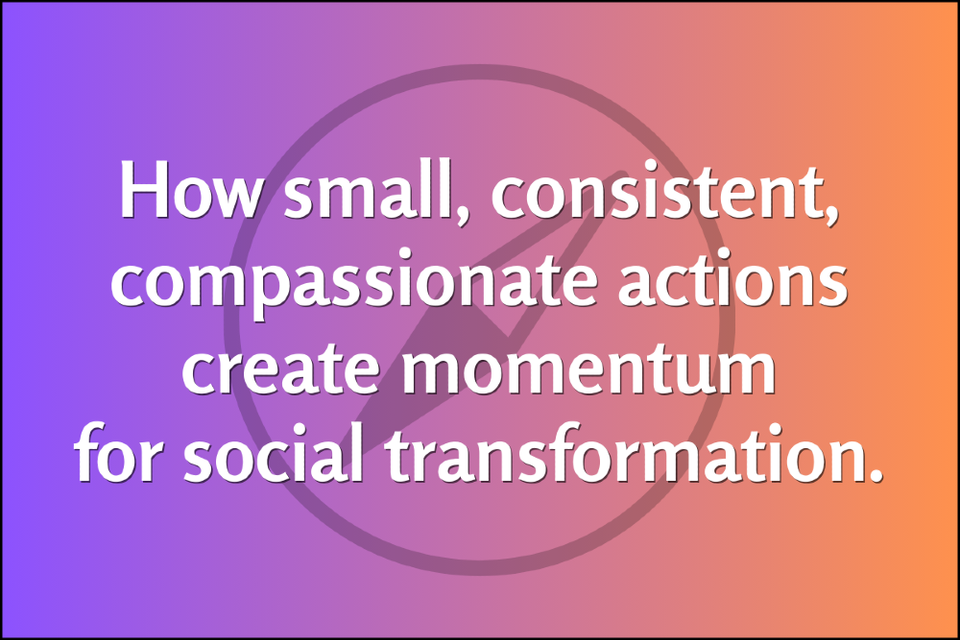A Taoist Approach to Human-Hearted Leadership in a Time of Crisis

Verse 63 of the Tao Te Ching offers sage advice for compassionate change-makers:
“Resolve the difficult
Through the easy.
Achieve the great
Through the small.
The difficult work in this world
Must begin with the easy;
The great work in this world
Must begin with the small.
That is why the wise,
To the last,
Do not struggle for greatness–
And it is why they are able
To achieve it.” *
True transformation begins with small, intentional actions.
This wisdom is especially vital for those committed to upholding our common humanity, dignity, equity, and respect.
The 2025 Trump regime is still in its early days (though it already feels too long). Yet, it has swiftly eroded widely accepted moral values, undermined basic human rights, and mocked ethical behaviour, the rule of law, facts, and truth.
If we who oppose the oligarchic take-over of governments, prejudice, hatred, racism, and violence are to overcome this chaotic disruption to society and democracy, we need to 'begin with the easy' and the small.
When countless individuals take small, consistent actions, they create the momentum needed for transformation.
If we focus on greatness (in the form of adulation or recognition) instead of dignity and respect for all people as the goal, we will lose against those in power who think they are great and better than everyone else.
For those who disrespect our common humanity, hubris will be their downfall.
The energy required to sustain hatred and self-centred greed is ultimately unsustainable—it erodes the mind, body, and spirit. These emotional states are physically and psychically damaging to the mind, body, and sense of self. They are a complete disconnect from recognizing one’s humanity in the face of another.
At our core, our primary and evolutionary emotional drivers are connection, safety, and nourishment.
These drivers, when fulfilled, make us feel good and secure. When we regularly experience all three, there is no need for defensiveness, posturing, or prejudice at the base level of humanity. If our basic needs are met, we can pursue “the great work in this world,” which might be as simple as learning a new skill or heading up an organization committed to managing climate change.
Figures like Trump, Musk, and Vance are driven by anger, insecurity, and a childlike need for recognition—yet they struggle with authentic human connection. This leads to sociopathy, making them antisocial, impulsive, and manipulative. We need to protect ourselves and the world from people like them who hold power over the freedom and mortality of others.
Lead from conviction, not for greatness, recognition, or attention.
Lead with the easy and the small, one step, one action at a time.
Try, and then try again.
Invite others to work with you, or simply lead in a way that your actions and deeds inspire others to take up your cause.
Some of us can do more than others. Some of us can only do a little at a time. Your leadership can be as easy as liking, sharing, and commenting on a post from someone who is working to make a difference.
Your next step might be to sign a petition and to share that with everyone you know. Whatever you feel you can do, do it. Start with the small and complete the easy.
Once you get started and keep going, you will experience momentum.
This is a key to transformational change: you need to take the first step and keep going.
The snowball rolls down the hill, gathering momentum and picking up ever more snow in its path. When you fuel momentum with inspiration—why your work or mission matters—you gain speed and begin to see real progress. This makes it easier to take the next simple step to what you are already doing because things now feel like they have a life of their own.
All this is what will make your leadership stand out to others.
People will see what you are doing, what you have accomplished, and your intense passion and focus that supports your cause and mission.
Just as this article started with a quotation from the Tao Te Ching, I developed my final idea one word and one sentence at a time. The idea grew and evolved from just a few words in verse 63 that inspired me to act:
“The difficult work in this world must begin with the easy.”
What Is Your Most Challenging Work?
Ask yourself, ‘What small, easy step can I take today toward making a difference?’
Send me a message or click the subscribe button to leave me a comment.
If you don’t know what you stand for, you won’t have a leg to stand on.
What are your core values? Do you know them by heart, or did you have to stop and think about them?
As an ethical change leader, you must be crystal clear on your values—and, more importantly, how you actively embody them in everything you say and do. People recognize when you lead with integrity and consistency, and that builds trust and influence. But they also notice when your actions don’t align with your words, which can weaken your credibility and impact.
Your values are your compass. They guide you toward the most efficient and impactful course of action. Without clear direction, you risk getting lost, making costly mistakes, or diluting your influence.
Want to be a stronger communicator, a sharper critical thinker, and a more effective leader?
Let’s meet for a conversation to reorient your compass so you can make the impact you’re meant to. Use the contact form below to share your details and the biggest challenge you’re currently facing as a leader.
* Hoff, Benjamin. The Eternal Tao Te Ching: The Philosophical Masterwork of Taoism And Its Relevance Today. New York: Abrams. 2021.





Member discussion